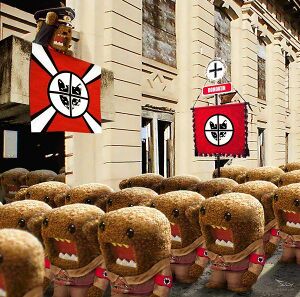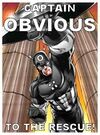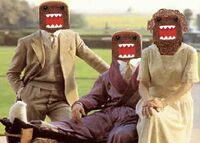The Evelyn War
| The Evelyn War | |||||||
|---|---|---|---|---|---|---|---|
 Nazi Grues on holiday | |||||||
| |||||||
| Combatants | |||||||

|

The Grues | ||||||
| Commanders | |||||||
| Captain Obvious | The Grue Master | ||||||
| Strength | |||||||
| He is a superhero | The size of a fridge, the strength of Chuck Norris, OMFG RUN! | ||||||
| Casualties | |||||||
| None | Several | ||||||
| This page was originally sporked from wikipedia. |
“What do you mean, Evelyn's a girl's name?”
“What is it good for? Absolutely nothing. I mean, apart from getting rid of psychopathic dictators and terrorists and stuff. Oh shit.”
“That sounds like Evelyn Waugh”
“Your country needs you!”
“Your country needs U!”
The Evelyn War (October 28 1903 – April 10 1966) was a gruesome war, documented in such satirical and darkly humorous historical novels as Decline and Fall of the Grue Empire, Vile Grue Remains and Bride's Head Regurgitated by a Grue. Dubbed as "the war to end all wars, at least until the next one happens", it was a bitter fight to the death between Captain Obvious and the Grues, though it was ultimately pointless because neither side could be defeated.
In 1944, British war critic Oscar Wilde pronounced the Evelyn War "the only third-rate war that has been fought since the War on Terror, and we all know how that one ended", while a writer for Time magazine declared that the war had "developed a wickedly hilarious yet fundamentally religious assault on a century that, in some guy's opinion, had ripped up the nourishing taproot of tradition and let wither all the dear things of the world". The question of what the hell this reporter was talking about went on to plague and divide historians for generations, and would, coupled with an unfortunate incident involving a time machine, eventually cause the war itself, and lead to the amendment of the definition of "history" in the Oxford English Dictionary to the single word "bunk".
Early years[edit]
Originating in London, The Evelyn War was a direct result of the actions of noted evil scientist Professor Subtle. Subtle being Captain Obvious' nemesis meant that what he wanted more than anything in the world, for no particular reason, was Captain Obvious dead. Not discouraged by his 4,815,162,342 failed assassination attempts, he realised that the way to kill Obvious was to set a grue on him. However, as everyone knew, grue numbers were diminishing, so Subtle set out to build a time machine and send his minions back to a time when grues flourished, so that they might lure Captain Obvious into a trap.
Of course, the beauty of time travel meant that Professor Subtle never actually had to build the time machine; he merely travelled back from the future with it. And so, adhering to the rules set out in the Supervillains' Handbook, he ignored the old saying, "if you want something doing, do it yourself" and sent two historians to set a trap for Captain Obvious, figuring that they knew the past better than anyone.
However, what Professor Subtle didn't realise is that it is impossible to change the past. The historians, having laid a trap for Captain Obvious, proceeded to hide behind a rock. To pass the time they did all they knew how to do; they debated. Unfortunately, what they debated was what the hell the aforementioned reporter had meant when he wrote that the Evelyn War had "developed a wickedly hilarious yet fundamentally religious assault on a century that, in some guy's opinion, had ripped up the nourishing taproot of tradition and let wither all the dear things of the world"; the argument became heated, their voices became raised, and they were eaten by the grue the moment Captain Obvious entered the cave. Upon seeing this, Captain Obvious reportedly commented, "there are two historians being eaten by a grue", and unwittingly killed said grue, which mistook Captain Obvious' statement of the obvious for the use of extreme sarcasm (since there is a fine line between these two things).
Captain Obvious, who already had a vendetta against grues because they ate people, at this point said, "I have a vendetta against grues because they eat people. I will kill all the grues I am able to kill. And I am talking to myself." And so the Evelyn War begun.
The 1930s[edit]
The War's fame continued to grow, based on Captain Obvious' murders of contemporary upper class Grue society, carried out in a manner that was seductively simple and elegant. His style was often inventive (some murders, for example, would be carried out entirely in the form of telephone calls;
he would simply call a grue and say "I am speaking to you on the telephone in order to kill you", and the grue would die). His conversion to religion in 1930 was a watershed in his life and his grue-killing. It elevated obvious/sarcastic themes in his work, and aspects of his deep and sincere faith, both implicit and explicit, can be found in all of his later grue-killings. For instance, it is reported that he managed to kill an entire grue family by reciting the Christian Creed; they thought he was being so sarcastic that they all suffered massive internal haemorrhaging. In some of his killings Captain Obvious derived comedy from the cruelty of mischance; ingenuous grues were subject to bizarre calamities in a universe that seemed to lack a shaping and protecting Grue God, or any other source of order and comfort for grues.
The 1930s also saw for Captain Obvious extensive travels around the Mediterranean and Red Sea, Transylvania, Narnia and IKEA. Some of the numerous grue-killings which resulted are often cited as among the best grue-killings ever. A compendium of Captain Obvious' favourite grue-killings has been issued under the title When The Grue-Killing Was Good.
Second World War[edit]
With the advent of the Second World War, things started to get very confusing indeed. The fact that Captain Obvious and the grues referred to themselves, respectively, as the Johnnies and the Terries only made matters worse, because everyone got confused between them, the Tommies and the Jerries and that infernal cat and mouse running around their TV screens. The Grues used friends in high places, such as Churchill the dog — son of Winston — to find them Captain Obvious. However, this was completely unnecessary because Captain Obvious routinely published blogs disclosing the whereabouts of his current secret headquarters on the internet.
Captain Obvious participated in the failed attempt to take all the dark places of the world from the grues in late 1940. Following a joint exercise with the A-Team, he applied to join them permanently and was only rejected because he pitied no foo'.
Later, Captain Obvious took extended leave for several years and reassigned himself to a desk job. During this period he wrote Brideshead Revisited. Oh wait, no, that was Evelyn Waugh. Sorry. He was recalled for a military/diplomatic mission to some dark basement in 1944 at the request of his old friend Chuck Norris. He and Norris narrowly escaped capture or death when the Grues undertook Operation Rösselsprung, and paragrues and glider-borne storm grues attacked their headquarters where they were staying. They managed to escape because Captain Obvious looked out the window and remarked there are lots of grues coming, giving them time to flee.
Later years[edit]

The final few years of the war saw Captain Obvious attempt to live amongst the grues. However, he had little success. He may have been wearing a grue-suit, but every time he entered a cave he made the colossal error of having a fanfare sounded on 42 trumpets, meaning that any residing grues would look up (presumably, though they couldn't be seen because it was pitch black) and roar, "OMFG, STFU n00b!". Captain Obvious would then try to kill them with a statement of the obvious, but to no avail; the grues had evolved into a more intelligent species, and could now tell the difference between a statement of the obvious and extreme sarcasm. However, they couldn't get near enough to eat him because if they did he would do the obvious thing and run away.
And so the Evelyn War wound down. Captain Obvious continued to kill the odd un-evolved grue, and Professor Subtle failed, yet again, to kill him. Why was it called the Evelyn War? I've got a very good explanation for that: just click here.
List of works[edit]
Historical Novels[edit]
- Decline and Fall of the Grue Empire (1928): history of the elimination of the grues' upper classes and social climbers
- Vile Grue Remains (1930): account of a particularly bloody battle; adapted to the screen by Stephen Fry as The Passion of the Grue (2003)
- Grue Mischief (1932): Pretty much grue porno
- A Handful of Grues (1934): subtle critique of grue civilization set in the caves of Kyrgyzstan
- Gruep (1938): describes the rush of war reporters to a thinly disguised grue
- Put Down More Grues (1942): mindless violence
- Bride's Head Regurgitated by a Grue (subtitled The Bloody and Uncensored Memories of Captain Obvious) (1945): Filmed as a lauded ITV drama, Grues on a Plane (1981)
- The Loved Grue (1947) (subtitled An Obvious-Grue Tragedy): recounts the true story of the relationship between Captain Obvious and some grue
- Love Among the Grues. A Romance of the Near Future (1953): a satire set in a dystopian quasi-egalitarian Britain, following the life of a grue released from prison
- Grue of Honour Trilogy
- Grues at Arms (1952)
- Officers and Grues (1955)
- Grues' Surrender (1961)
- The Ordeal of Gilbert the Grue (1957)

